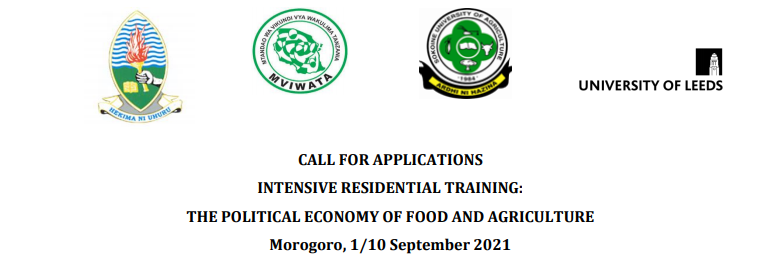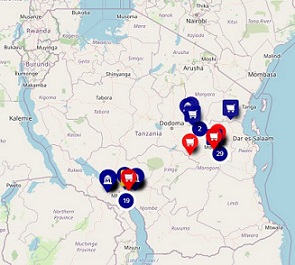
CALL FOR APPLICATIONS INTENSIVE RESIDENTIAL TRAINING:
THE POLITICAL ECONOMY OF FOOD AND AGRICULTURE
Morogoro, 1/10 September 2021
Voices, needs, and concerns among African producers are hardly a priority in national politics, but whole food systems depend on their produce. The farmers are rarely consulted about food markets and the how food gets from producer to consumer, or about their needs to support production and trade. At an international level, the voice of the small producer is virtually non-existent, with markets dominated by large multinationals in food trade, processing manufacture and more recently retail. Often, the farmers struggle to feed themselves and their families, and end up producing food to meet the demands of far-off markets. Farmers’ organisations like MVIWATA aim at making the voice of farmers heard in everyday politics. Academic researchers can help to this end, by producing research that is informed by the priorities and the agenda of farmers’ organisations.
This training, and the research internship programme attached to it, aims at strengthening the research skills of young scholars and activists who are interested in working with farmers’ organisations in the longer term. The broader idea is to support the training of the next generation of Tanzanian researchers to develop alternative visions of food and agriculture, with a focus on food sovereignty, in a spirit of service to the farmers’ organizations.
Step 1: the training programme
The training seeks to build capacity of post-graduate students and activists in agrarian studies. It is a pluralist training, delivered by Tanzanian and international scholars, integrating different theoretical perspectives broadly along the lines of Marxist political economy.
The methodological part will revolve around the Marxist framework of Systems of Provision (SoP)
, with particular attention devoted to the analytical connections between local, regional, national and global levels of analysis.
This is a residential programme, with an average of eight hours of activities every day, including lectures, seminars, small-group activities and practical sessions.
A total of 21 participants will reside in Morogoro from September 1st to 10th 2021.
The working language of the training will be English, to allow for international and national speakers to join.
Each participant will receive a Certificate of Attendance at the end of the training.
During the training, the skills and abilities of all participants will be actively assessed to establish their suitability for the internship programme. Out of 21 participants, 6 will be selected for the research internship programme (Step 2).
Step 2: the research internship programme
The 6 participants who will be selected during the training will be placed for an internship at MVIWATA- Morogoro for 3 months. The internship will start right after the conclusion of the training (13 September/13 December).
The objective of the internship is to support the creation of an internal research culture in the host organisation.
Step 3: Pilot Research
Each intern will design and carry out one pilot research, including primary research in rural areas. The design of this research will be defined during the final part of the training.
Each intern will be assigned an academic supervisor at one of the universities involved in the project (UDSM, SUA, and University of Leeds).
At the end of the internship, the intern will write a pilot research
report, whose findings
will be disseminated both internally at MVIWATA and at the national level through a dissemination event.
In the long-term, the research findings can lead to joint publications with the academic supervisors as articles in international journals. More details about the following steps will be shared with participants during the training.
Training Objectives
- Introductory module: introduction to food and agriculture in the global political economy of capitalism; introduction to alternative visions for agriculture and food, rooted in agro- ecology and food sovereignty paradigms
- Theoretical module: Marxist political economy and the System of Provision (SoP) approach
- Methodological module: how to design your research; quantitative and qualitative research methods; data analysis; research ethics.
Context
This training and internship programme is part of a broader project led by the University of Leeds (UK), with funding from the UK Arts & Humanities Research Council (AHRC). The project – ‘Farmers’ Perspectives on Challenges in The Food System – aims at strengthening the partnership between universities and farmers’ organisations, with the broader aim of ensuring that academic research responds to the needs and priorities of farmers’ associations.
The training will be hosted by Mtandao wa Vikundi vya Wakulima Tanzania (MVIWATA), in collaboration with the University of Dar es Salaam (UDSM), the Sokoine University of Agriculture (SUA) and the University of Leeds (UK). The project includes Tanzania and Ghana where the University of Leeds is collaborating with the Peasant Farmers Association of Ghana (PFAG), besides the University of Cape Coast (Ghana) and the University for Development Studies (Ghana).
For further details about the project and application procedures kindly contact the reference persons mentioned below.
Who can apply?
Participation is open to students and activists. All participants will be equally treated as early career researchers (ERC).
Post-graduate students from other Universities in Tanzania are encouraged to apply, but priority will be given to students from the collaborating institutions namely the University of Dar es Salaam, Sokoine University of Agriculture (SUA) and activists who have a track record of activism on issues that are prioritised by the Mtandao wa Vikundi vya Wakulima Tanzania (MVIWATA) – such as agriculture, agroecology, land, seeds, food sovereignty and cognate issues.
For activists, there is a minimum requirement of holding an undergraduate degree and having a consolidated activist record in relevant fields.
For students, we particularly encourage postgraduate students at the early stage of their PhD or MA studies, as well as activists who are currently enrolled in an undergraduate degree or hold an undergraduate degree. All applicants are expected to have a consolidated interest in agrarian questions of food, land and agro-ecology, broadly framed in the political economy of agriculture and food. In your statement of interest, we want to know why you are applying, what you expect from the training, and how you are going to use the knowledge acquired during the training in your future endeavours.
We particularly
encourage applications from students who have an interest in Marxist Political Economy and Agrarian Studies and
participants who are involved or have experience of activism and research, or who have experience with
civil society organizations on food and agriculture. Women who meet these qualifications are strongly encouraged to
apply. Given that the general thrust
of this project is to train early career researchers, against similar
backgrounds priority will be given
to younger candidates.
Minimum requirements
Applicants must:
- hold a Bachelor degree in a relevant discipline
- have a level of English that allows them to actively participate in class activities and write academic reports
- ensure their full, unconditional availability for the whole 10 days of the residential training
– no partial attendance will be allowed
- be potentially interested and available for a 3-months research internship at MVIWATA
Further info
The training will be hosted at the general headquarters of MVIWATA in Morogoro. MVIWATA will provide basic single-occupancy accommodation in Morogoro for 12 nights. Facilitation will include a public bus ticket to Morogoro and a daily allowance to cover for local transport, food and drinks. Participants will receive a hard-copy reader with all the readings needed to attend classes.
How to apply
Interested applicants should write an application letter and enclose it with the following documents:
- Statement of interests – explain why you are interested in this training.
- Curriculum Vitae (CV) with the names and contacts of two referees.
- If already awarded, copy of certificate of the highest attained degree. If not yet awarded, a transcript of academic records will suffice, or in alternative, a reference letter.
Please send your statement of interest and CV in one document, in either Word or PDF format.
Key timeline
Applications should be sent in electronic form by July 5th 2021 at midnight (EAT) at the following email address:
This is a rigid deadline. Late applications will not be considered.
Only successful applicants will be notified of the results by end of July. If you have not been contacted by the end of July, please assume that your application has been unsuccessful. We are really sorry we cannot provide individual feedback on your application.
The training is scheduled for September 1/10 inclusive, with participants expected to report in Morogoro on August 31 and being released on the 10th in the evening.
The research internship programme will start after the training. Primary research in rural areas will be carried out in September and October 2021.
Reference persons
Theodora Pius (about application process and logistics) Project Coordinator- MVIWATA theodora.pius@mviwata.or.tz
+255 753 408 154
Dr. Richard Mbunda (about application process and training content)
Tanzania Team Coordinator – UDSM rmbunda@gmail.com
+255 714 848 685
Released on 17th June 2021







